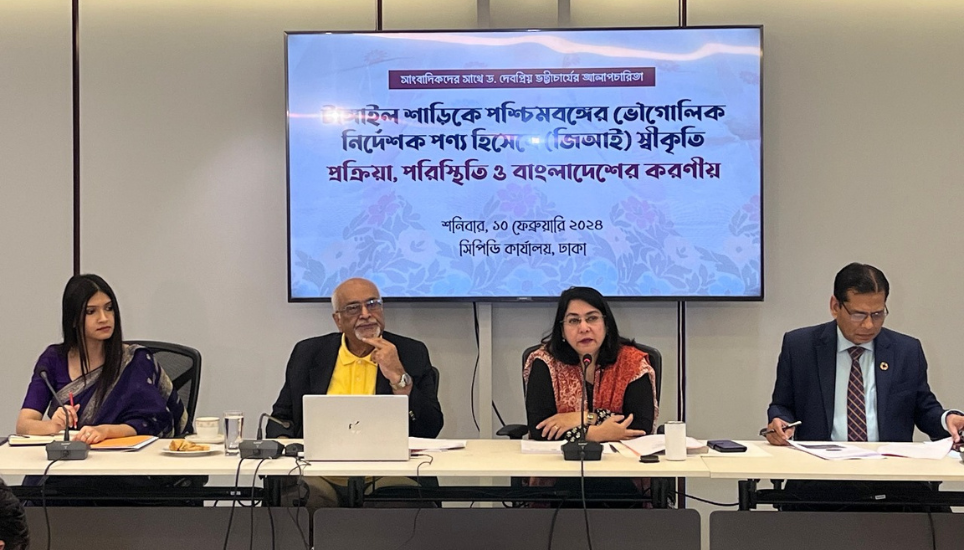
The Centre for Policy Dialogue (CPD) has urged the Bangladesh High Commission in India to take legal action, set up a multi-disciplinary taskforce under the industries ministry, and agree to the Lisbon Treaty to protect Tangail saree and other geographical indications (GI).
It also recommended incorporating national legislation and TRIPS agreement (The Agreement on Trade-Related Aspects of Intellectual Property Rights) to protect the traditional knowledge of the country as Bangladesh and India share cultures.

CPD Distinguished Fellow Dr Debapriya Bhattacharya made these recommendations during a press conference on Tangail Saree's GI issue, held at the capital’s Dhanmondi on Saturday. CPD Executive Director Dr Fahmida Khatun moderated the event.
It should be noted that on January 2 this year, the Government of West Bengal in India received the Geographical Indication (GI) certification for “Tangail Saree of Bengal,” based on an application from the West Bengal State Handloom Weavers Co-operative Society Ltd in 2020.
Later, on February 1, India’s Ministry of Culture claimed on their official Facebook page that “The Tangail saree, originating from West Bengal, is a traditional hand-woven masterpiece. Renowned for its fine texture, vibrant colours, and intricate Jamdani motifs, it epitomises the region’s rich cultural heritage.”
Upon facing fierce criticism and protest from Bangladeshi citizens online, the Indian Ministry of Culture was compelled to take down the post from their social media.
Addressing Saturday’s CDP programme, Debapriya said, “Every week, more than 50,000 Tangail sarees are exported to India, and we have specific economic interests in this product. They are misusing information, falsely and misleadingly claiming our Tangail Saree as their GI product.
“India stated that the weavers migrated to India during partition, although this is factually incorrect. There are many weavers in Tangail who are Muslims and have been involved in this profession for a long time.”
Debapriya continued, “Using our ignorance and lack of knowledge, they published the journal in August last year, but no one – including the government, trade body, and the manufacturers union – objected to it.
“India is seeking several GIs on products including Bengal Muslin, which belongs to Bangladesh.”
A Geographical Indication (GI) is a form of intellectual property right used on products that originate from a distinct geographical location, and embody characteristics attributable to that particular origin.
So far, there have been 21 products registered as GI of Bangladesh such as Jamdani, Hilsa fish, Khirsapati mango, Dhakai Muslin.
CPD Distinguished Fellow Prof Mustafizur Rahman said, “Rather than looking at this as a case study, we need to identify areas of potential in the larger interest in terms of GI, traditional knowledge, and other things.
“After LDC graduation these subjects will contribute to our capacity building.”
He added, “The 2nd generation challenge is now upon us. Procedure and outcome are equally important in such cases. We have to go to the dispute settlement body and negotiate. This should be considered as an opportunity because in future we will face more problems like this.”
The journal copy of the GI “Tangail Saree of Bengal” was published on August 31 last year, but the Department of Patents, Designs and Trademarks (DPDT), industries ministry, and the Bangladesh government, did not take note of it.
Debapriya said, “The DPDT must act to register the GI of Tangail Saree following fully and faithfully the laid out process. The argument for migration of skills and knowledge during partition is not strong, as GIs must be linked in a specific territory.
“The Bangladesh High Commission should consult competent lawyers in India. The Bangladesh Permanent Mission in Geneva may speak to World Intellectual Property Organization (WIPO) officials to explore options regarding an appeal against Tangail Saree of Bengal.”
He then added, “The government may set up a multi-disciplinary taskforce to advise the relevant domestic parties, including the producers and trade bodies, to pursue the matter on different fronts.
“The task force could recommend measures so that such a situation does not arise in the future. If we are not mindful, similar incidents may happen in case of traditional knowledge which is developed, sustained, and passed on from generation to generation within a community as Bangladesh and India have shared culture.”
Naima Jahan Trisha, programme associate of CPD was present at the conference along with other officials.